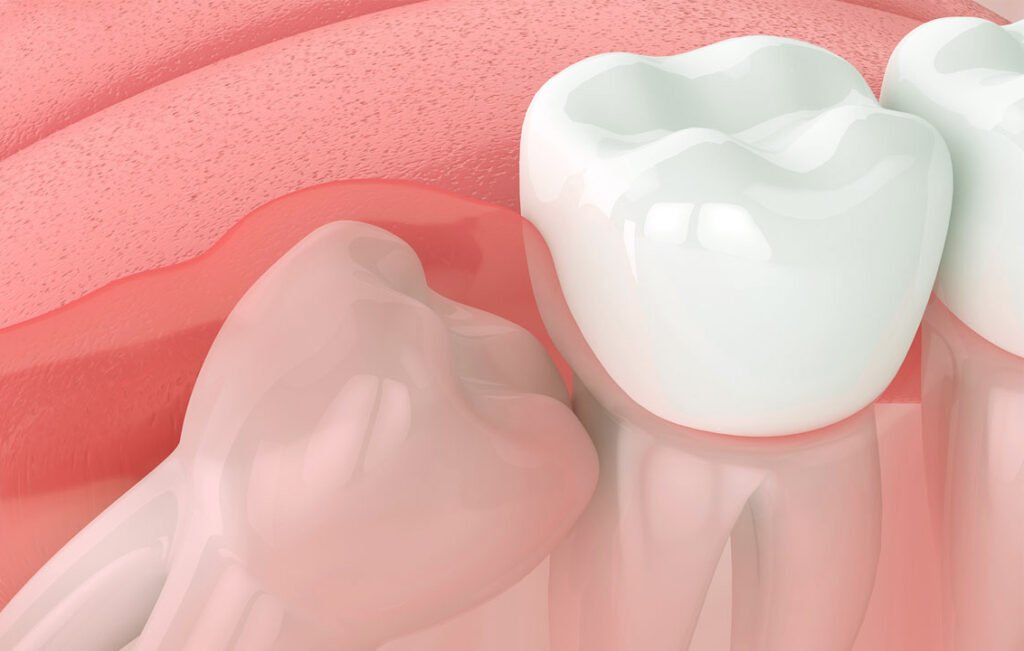
What is wisdom tooth?
Wisdom tooth are the third permanent molars that grow at the back of your gums and are the last teeth to erupt. Usually most people have 4 wisdom teeth. However, it can vary, some may have only two or even none.
Wisdom teeth tend to grow in between the ages of 17-25. Sometimes, there is no enough space in the mouth for the wisdom teeth to grow properly and they can emerge at an angle or get stuck. Wisdom teeth like this are known as impacted.
When to make an appointment
If your wisdom teeth are causing pain, it is better to visit us for a check-up. From there, we can advise you whether they need to be removed. Sometimes, we will carry out an X-ray to give a clearer view of the the position of teeth.
Why are wisdom teeth removed?
Not all wisdom teeth need to be removed. Only those impacted wisdom teeth that causing pain or discomfort are indicated for removal. They can lead to more serious dental problems if left untreated.
- Tooth decay, especially at the adjacent molar which is usually hard to detect
- Pericoronitis (inflammation of soft tissue around the affected tooth)
- Abscess or swelling
How wisdom teeth are removed
You’ll usually be given a local anaesthesic injection to numb the area around the tooth. You’ll feel some pressure just before the tooth is removed, as the dentist needs to loosen the tooth by rocking the tooth back and forth.
A small cut in the gum is sometimes necessary to expose the tooth which is then may need to be cut into smaller pieces before it’s removed.
It takes anything from a few minutes to 30 minutes, or sometimes even longer, to remove a wisdom tooth.
After your wisdom teeth have been removed, you may have some swelling and discomfort. It may last 3-4 days and we advise soft diet and light work during this recovery phase.
Find out more about cost of wisdom tooth removal by contacting us here.

你好,請問拔智慧牙是多少錢呢?
PM
你好,请问拔智慧牙是多少钱呢?
PM
Hi there,
May I know what’s the price range for wisdom tooth removal?
PM done.
Appreciate your advice on cost for wisdom tooth removal, xray, consultation and cleaning price. Thanking you in advance.
Hi, pm done. Please check your email. You can also reach us by whatsapp +6011-65382828.
How much cost extration wisdom
Hi, May I know the price for wisdom tooth removal ?
PM done
Hi , may i know the price removal for wisdom tooth removal ?
PM done
Hi, May I know the price for wisdom tooth removal ?
PM done
Hi, may I know the price range for wisdom teeth removal?
PM done
Request for wisdom tooth removal, xray, consultation and cleaning price
PM done
Hi there,
May I know what’s the price range for wisdom tooth removal?
PM done
Pm harga
May I know the cost of wisdom tooth extract?
PM done
May I know the cost of wisdom tooth extraction?
Hi, PM done. Please check your email
你好,請問拔智慧牙是多少錢呢?
May I know the cost of wisdom tooth extraction?
PM done. Please check your email. For faster response, please kindly WhatsApp us +601165382828. Thank you
Hi, may I check with you how is the pricing for
1. wisdom tooth extraction with surgery
2. coronectomy
PM done. Please check your email. For faster response, you can Whatsapp us +601165382828
May I know how much of minor oral surgery to remove the wisdom teeth
PM done. Please check email. You can whatsapp us +601165382828 for fast response. Thank you
How much is the cost Wisdom tooth removal. Inside the gum and bone.
PM done. You can whatsapp us +601165382828 for faster response. Thank you
Hi there can you advise
a) what is price for consult/xray/procedure for 1 wisdom tooth removal
b) can everything be done in one appointment consult/xray&procedure?
c) can you confirm dissolvable stitches are used so no need to return to clinic again to remove stitches
Looking to travel to JB to do this treatment and will only be in JB for only couple days.
Hi, PM done. Please check your email. For faster response, please whatsapp us at +601165382828. Thank you.
How much does it cost to remove impacted wisdom teeth?
Hi, please kindly call or whatsapp us at +601165382828 for appointment. Thank you